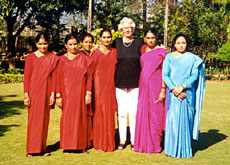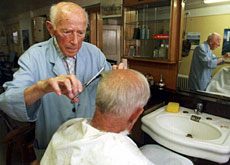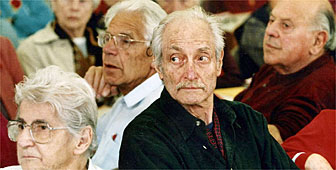Pensioners put to work abroad

For the past 25 years, a Swiss foundation has been sending pensioners abroad to help set up development and business projects.
Rather than just sit back and collect their retirement packages, these senior citizens are using their knowledge and experience to benefit a worthy cause.
They are part of the Senior Expert Corps, run by Swisscontact, the Swiss Foundation for Technical Cooperation.
The foundation provides training, financial aid, small credit as well as management consulting to Eastern Europe and developing countries.
“It was 25 years ago that we decided to take on pensioners as volunteer experts to advise small and medium-sized companies (SMEs),” Swisscontact spokesman Ueli Stilli told swissinfo.
The foundation – which is publicly and privately funded – competes for contracts abroad and is currently involved in 90 projects.
The Senior Expert Corps has a mainly advisory role. It has 470 members, with an average age of 65.
Market economy
Sixty-seven-year-old Christian Boesch is one of those experts. He was sent to Transylvania, a region in Romania more likely to be associated with Dracula than with the market economy.
The former diplomat and head of the Zurich chamber of commerce saw the region undergo a transformation. New industries such as paper mills and industrial bakeries sprang up, seeking new funding as they expanded.
Funding from Romanians abroad was available, but the new companies had to ensure the quality of their products to receive any money. “People there have fully understood the principles of a market economy,” Boesch told swissinfo.
In the Transylvanian town of Odorheiu, there is now a chamber of commerce with 130 members, run by four employees. The chamber has also become a political force locally.
Boesch says the main difficulty in converting people to a market economy was convincing them that it could work and that Romania could compete with the West.
Western standards
Elsbeth Fopp-Bögli is one of the women who make up nine per cent of the corp’s contingent. The hotel veteran headed to Nepal for ten weeks in 1997, at the age of 66, where she quickly discovered things were slightly different from home.
“There were no cleaning ladies in the hotels, only men,” she said. “Women weren’t allowed to do these jobs in Nepal.”
Fopp-Bögli adds that one of the biggest hurdles was convincing the men to clean the bathrooms and toilets to Western standards.
The Swiss expert’s job was to ensure that local hotels could meet Western expectations, and bring in tourist dollars.
Part of Fopp-Bögli’s work also involved training hotel management in how to deal with female employees.
“We had to ensure communication went from the top to the bottom, hold daily management meetings, and introduce some form of protocol,” Fopp-Bögli said.
Respect
The expert says her position as a foreign senior meant that she could defend the interests of the female Nepalese employees. She adds that traditional Nepalese respect for age was also an advantage when dealing with management.
“A person with white hair is considered to have authority in Nepal,” she said.
Fopp-Bögli returned to Nepal two years after her first trip and was pleased to see that her standards were being maintained. She adds that her expertise was decisive.
“It just shows that if you’re competent, you will be accepted anywhere even if you don’t speak the language.”
swissinfo, Alexander Künzle (translation: Scott Capper)
Swisscontact was created in 1959, focusing on training, financial aid, small credit as well as management consulting in Eastern Europe and developing countries.
It receives around SFr3 million from donors, and over SFr25 million from the federal annually.
Swisscontact has been running its Swiss Expert Corps for 25 years.
It is made up of retired people, who work mostly as volunteer experts advising SMEs in Eastern Europe and developing countries.
Around 470 people belong to the Corps, with an average age of 65.

In compliance with the JTI standards
More: SWI swissinfo.ch certified by the Journalism Trust Initiative


You can find an overview of ongoing debates with our journalists here. Please join us!
If you want to start a conversation about a topic raised in this article or want to report factual errors, email us at english@swissinfo.ch.